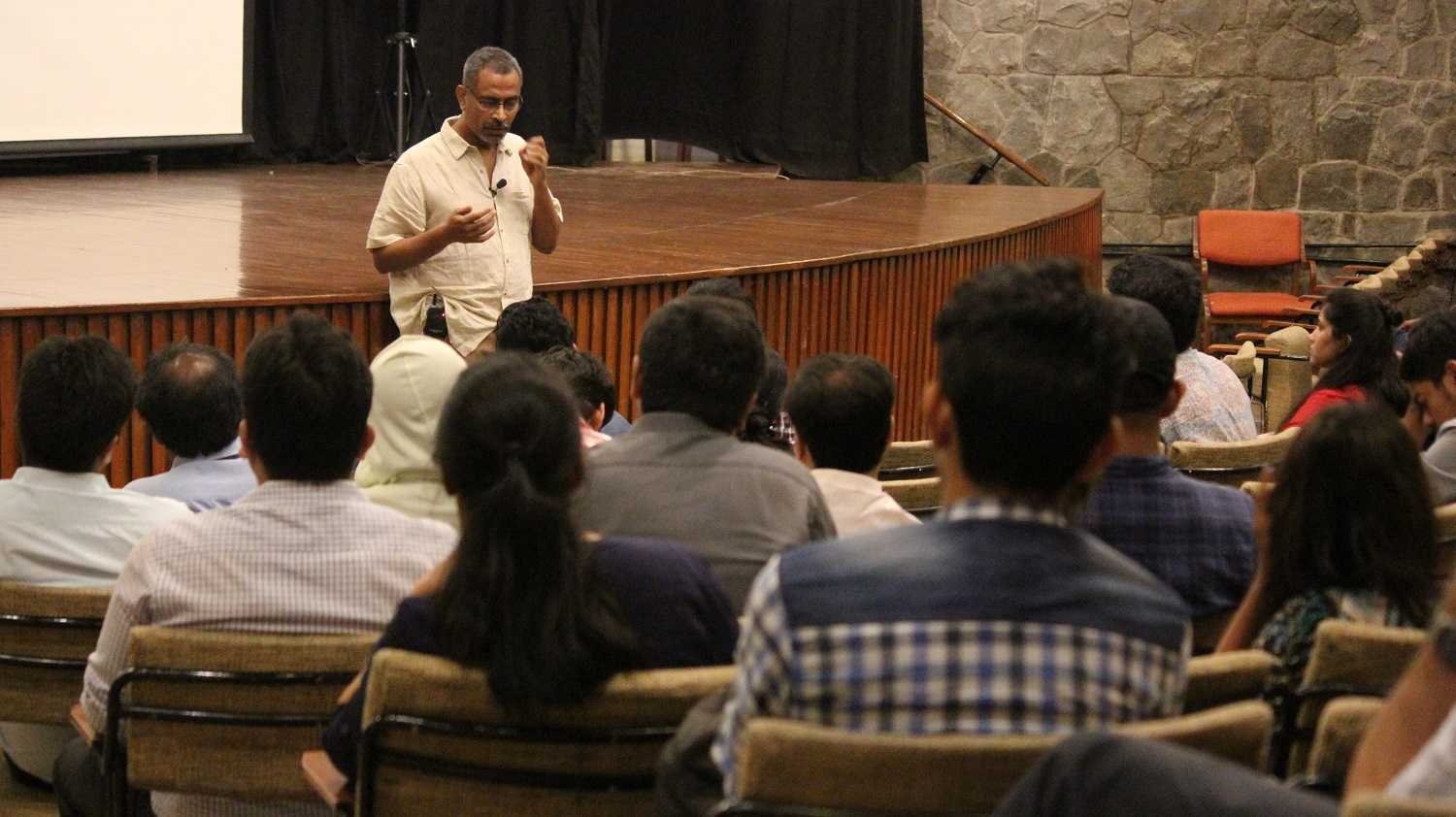Ramani engaged with ideas of subjectivity and personal expression by tracing his journey as a filmmaker in an absorbing masterclass at the ongoing documentary festival.
Inability to film something, that is an image for me: Filmmaker RV Ramani at Open Frame Film Festival
New Delhi - 14 Sep 2018 16:00 IST
Updated : 17:51 IST


Sukhpreet Kahlon
Filmmaker RV Ramani began his masterclass titled ‘Subjective Real’ at the Open Frame Film Festival 2018, by evoking the idea of uncertainty. Speaking about the idea that the best laid plans can go awry and that, as a filmmaker, one needs to deal with the uncertainty of things, he said, “I like the moment of unsureness…I feel this is more important than being sure, especially in documentary films.”
Ramani extended this notion of uncertainty to contemplate on the idea of loss, employing it as a framing idea to reflect upon his journey as a filmmaker. He shared some of his earliest moments of handling the camera to engage with the loss of shot material or footage, and delved into his strategies of overcoming a sense of loss when faced with a situation where what he had shot is no longer available to him. Instead of getting bogged down by it and feeling incapacitated, he said, “I take it as an advantage and move forward”.
Taking the eager audience through his films, he broadened this frame by illustrating examples from his filmmaking practice and showed a clip from My Camera And Tsunami (2011), a film that foregrounds the memory of a camera which perished in the Tsunami, along with its last filmed footage. He explained how the film was also about overcoming a sense of loss where what is shot is no longer there. While tracing his journey and thoughts, Ramani constantly focused on the type of technology used in each of his films, that came with their own challenges, artistic choices and encounters.
Elucidating on the idea of subjectivity and personal expression, he talked about his first film Saa (1991), which he described as being “a reference note for myself to understand what kind of work I can do”, looking at the journey of the filmmaker as an artist. Exploring this further he said, “I make films as a therapy for myself…. There are many films where I try to resolve issues through images”, showing a clip from the film One Two Three Four (1995), “a film where I tried to heal myself in a certain way.”
Ramani explored the intimacy of a filmmaker with their subject by offering an example from Hindustan Hamara (2014), a visual conversation with filmmaker Anand Patwardhan as the latter screens his films for diverse audiences across the country. Ramani said, “As a filmmaker it is important to maintain some boundaries and not become too close [to the subject] but I try to create a certain intimacy with the ways in which the images are formed.”
The film also enabled him to examine how justified one is in speaking against something and exploring that narrative. He added, “I believe in intimacy as an image making process”, one which is not just about shooting someone but one where the filmmaker is engaging in the image making process. He also opined that a filmmaker can create an intimate imagery in an affectionate way through the camera, by not making the person an object.
Unravelling a thread from Paromita Vohra’s masterclass titled ‘You Talking To Me? The Documentary As A Form Of Conversation’, which was held a day earlier on 12 September, Ramani began the second part of his masterclass by speaking about the notion of representation, concerns on ways of representation and anxieties about misrepresenting someone and the politics therein. He explained this by showing an interesting clip from his 2016 film A Documentary Proposal, wherein he showed a sequence of his filming a meeting with auteur Mrinal Sen, where Films Division officials take a proposal to make a documentary film on the auteur. The clip opened up thoughts about the notion of consent and how the negotiation takes place through the process of filming.
He mentioned his current project which loops back to his reflections on memory and the loss of it but in a different way, as he felt deep connection with theatre artist Maya Krishna Rao’s mother, Bhanumathi Rao and almost impulsively decided to make a film on her.
In a poetic ending to his thought-provoking masterclass, Ramani showed a clip from My Camera And Tsunami saying, “The inability to film something, that is an image for me”.
The masterclass was held at the ongoing Open Frame Film Festival on 13 September 2018 at the India International Centre, New Delhi.
Related topics
Open Frame Film Festival

